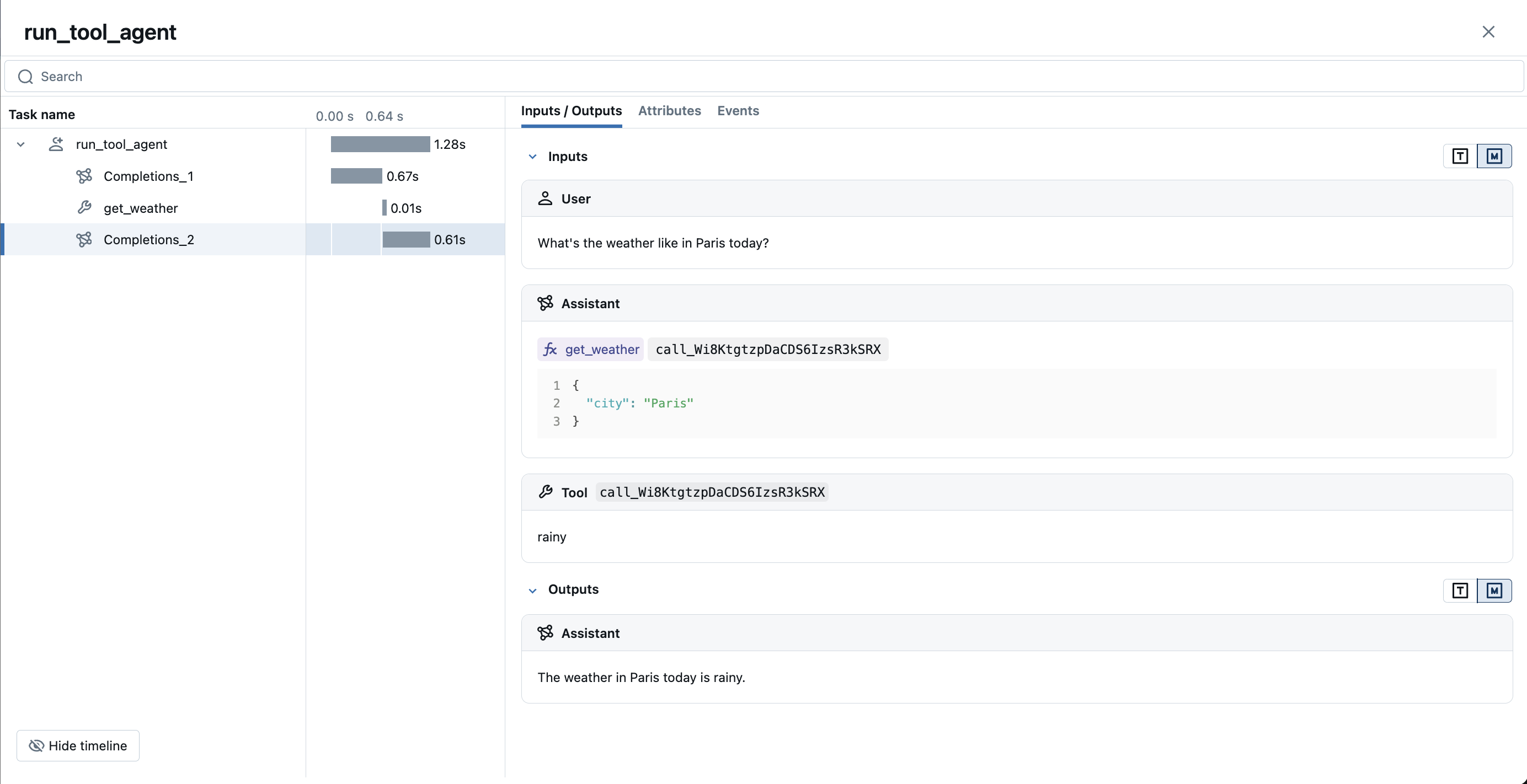OpenAIのトレース

MLflow Tracing は、OpenAI の自動トレース機能を提供します。自動トレースを有効にする
OpenAI の場合、mlflow.openai.autolog 関数を呼び出して MLflow はLLM呼び出しのトレースをキャプチャし、アクティブなMLflowエクスペリメントに記録します。
MLflow トレースでは、OpenAI 呼び出しに関する次の情報が自動的にキャプチャされます。
- プロンプトと完了応答
- 待ち時間
- モデル名
temperature、max_tokensなどの追加のメタデータ (指定されている場合)。- 応答で返された場合の関数呼び出し
- 例外が発生した場合
前提 条件
OpenAIで MLflow Tracing を使用するには、 MLflow とOpenAI SDKをインストールする必要があります。
- Development
- Production
開発環境の場合は、Databricks の追加機能と openaiを含む完全な MLflow パッケージをインストールします。
pip install --upgrade "mlflow[databricks]>=3.1" openai
フル mlflow[databricks] パッケージには、Databricks でのローカル開発と実験のためのすべての機能が含まれています。
本番運用デプロイメントの場合は、 mlflow-tracing と openaiをインストールします。
pip install --upgrade mlflow-tracing openai
mlflow-tracingパッケージは、本番運用での使用に最適化されています。
OpenAI で最高のトレース エクスペリエンスを得るには、MLflow 3 を強くお勧めします。
例を実行する前に、環境を構成する必要があります。
Databricks ノートブックの外部ユーザーの場合 : Databricks 環境変数を設定します。
export DATABRICKS_HOST="https://your-workspace.cloud.databricks.com"
export DATABRICKS_TOKEN="your-personal-access-token"
Databricks ノートブック内のユーザーの場合 : これらの資格情報は自動的に設定されます。
API キー : OpenAI API キーが構成されていることを確認します。本番運用環境では、セキュアMosaic AI Gateway DatabricksAPIキー管理のために、ハードコードされた値の代わりに または シークレット を使用します。
export OPENAI_API_KEY="your-openai-api-key"
サポートされている API
MLflow は、次の OpenAI APIの自動トレースをサポートしています。
チャット完了 | Embeddings | 関数呼び出し | 構造化出力 | ストリーミング | 非同期 | 画像 | オーディオ |
|---|---|---|---|---|---|---|---|
✅ | ✅ | ✅ | ✅ (※1) | ✅ (※2) | ✅ (※1) |
(*1)ストリーミングのサポートは MLflow 2.15.0 で追加されました。
(*2)サポートされる非同期出力と構造化出力は、MLflow 2.21.0 で追加されました。
追加の のサポートをリクエストするには、 でAPIs 機能リクエスト GitHubを開いてください。
基本的な例
サーバレス コンピュート クラスタでは、生成 AI トレースフレームワークの自動ログは自動的に有効になりません。 トレースする特定の統合に対して適切な mlflow.<library>.autolog() 関数を呼び出して、自動ログを明示的に有効にする必要があります。
import openai
import mlflow
import os
# Ensure your OPENAI_API_KEY is set in your environment
# os.environ["OPENAI_API_KEY"] = "your-openai-api-key" # Uncomment and set if not globally configured
# Enable auto-tracing for OpenAI
mlflow.openai.autolog()
# Set up MLflow tracking to Databricks
mlflow.set_tracking_uri("databricks")
mlflow.set_experiment("/Shared/openai-tracing-demo")
openai_client = openai.OpenAI()
messages = [
{
"role": "user",
"content": "What is the capital of France?",
}
]
response = openai_client.chat.completions.create(
model="gpt-4o-mini",
messages=messages,
temperature=0.1,
max_tokens=100,
)
本番運用環境では、安全な キー管理のために、ハードコードされた値の代わりにMosaic AI Gateway またはDatabricksシークレットAPI を使用します。
秘密のOpenAIの例
シークレットが保存されたら、それを MLflow トレース コードで使用します。
import openai
import mlflow
import os
# Configure your secret scope and key names
secret_scope_name = "openai-secrets"
secret_key_name = "api-key"
# Retrieve the API key from Databricks secrets
os.environ["OPENAI_API_KEY"] = dbutils.secrets.get(
scope=secret_scope_name,
key=secret_key_name
)
# Verify the API key was loaded successfully
assert os.environ["OPENAI_API_KEY"] is not None, "API key not loaded from secrets"
# Enable auto-tracing for OpenAI
mlflow.openai.autolog()
# Set up MLflow tracking to Databricks
mlflow.set_tracking_uri("databricks")
mlflow.set_experiment("/Shared/openai-tracing-demo")
# Now you can use OpenAI as usual
openai_client = openai.OpenAI()
messages = [
{
"role": "user",
"content": "What is the capital of France?",
}
]
response = openai_client.chat.completions.create(
model="gpt-4o-mini",
messages=messages,
temperature=0.1,
max_tokens=100,
)
ストリーミング
MLflow TracingはAPI OpenAI のストリーミングSDK をサポートしています。自動トレースと同じ設定では、MLflow はストリーミング応答を自動的にトレースし、連結された出力をスパン UI にレンダリングします。レスポンスストリームの実際のチャンクは、「 Event 」タブにも確認できます。
import openai
import mlflow
import os
# Ensure your OPENAI_API_KEY is set in your environment
# os.environ["OPENAI_API_KEY"] = "your-openai-api-key" # Uncomment and set if not globally configured
# Enable trace logging
mlflow.openai.autolog()
# Set up MLflow tracking to Databricks if not already configured
# mlflow.set_tracking_uri("databricks")
# mlflow.set_experiment("/Shared/openai-streaming-demo")
client = openai.OpenAI()
stream = client.chat.completions.create(
model="gpt-4o-mini",
messages=[
{"role": "user", "content": "How fast would a glass of water freeze on Titan?"}
],
stream=True, # Enable streaming response
)
for chunk in stream:
print(chunk.choices[0].delta.content or "", end="")
非同期
MLflow TracingAPISDKは、MLflow 2.21.0 以降の OpenAI の非同期 をサポートしています。使用方法は同期 API と同じです。
import openai
import mlflow
import os
# Ensure your OPENAI_API_KEY is set in your environment
# os.environ["OPENAI_API_KEY"] = "your-openai-api-key" # Uncomment and set if not globally configured
# Enable trace logging
mlflow.openai.autolog()
# Set up MLflow tracking to Databricks if not already configured
# mlflow.set_tracking_uri("databricks")
# mlflow.set_experiment("/Shared/openai-async-demo")
client = openai.AsyncOpenAI()
response = await client.chat.completions.create(
model="gpt-4o-mini",
messages=[
{"role": "user", "content": "How fast would a glass of water freeze on Titan?"}
],
# Async streaming is also supported
# stream=True
)
関数呼び出し
MLflow Tracing は、OpenAI モデルからの関数呼び出し応答を自動的にキャプチャします。 応答内の関数命令は、トレース UI で強調表示されます。さらに、 @mlflow.trace デコレータを使用してツール関数に注釈を付けて、ツール実行のスパンを作成できます。

次の例では、OpenAI Function Calling と OpenAI の MLflow Tracing を使用して、単純な関数呼び出しエージェントを実装します。
import json
from openai import OpenAI
import mlflow
from mlflow.entities import SpanType
import os
# Ensure your OPENAI_API_KEY is set in your environment
# os.environ["OPENAI_API_KEY"] = "your-openai-api-key" # Uncomment and set if not globally configured
# Set up MLflow tracking to Databricks if not already configured
# mlflow.set_tracking_uri("databricks")
# mlflow.set_experiment("/Shared/openai-function-agent-demo")
# Assuming autolog is enabled globally or called earlier
# mlflow.openai.autolog()
client = OpenAI()
# Define the tool function. Decorate it with `@mlflow.trace` to create a span for its execution.
@mlflow.trace(span_type=SpanType.TOOL)
def get_weather(city: str) -> str:
if city == "Tokyo":
return "sunny"
elif city == "Paris":
return "rainy"
return "unknown"
tools = [
{
"type": "function",
"function": {
"name": "get_weather",
"parameters": {
"type": "object",
"properties": {"city": {"type": "string"}},
},
},
}
]
_tool_functions = {"get_weather": get_weather}
# Define a simple tool calling agent
@mlflow.trace(span_type=SpanType.AGENT)
def run_tool_agent(question: str):
messages = [{"role": "user", "content": question}]
# Invoke the model with the given question and available tools
response = client.chat.completions.create(
model="gpt-4o-mini",
messages=messages,
tools=tools,
)
ai_msg = response.choices[0].message
messages.append(ai_msg)
# If the model request tool call(s), invoke the function with the specified arguments
if tool_calls := ai_msg.tool_calls:
for tool_call in tool_calls:
function_name = tool_call.function.name
if tool_func := _tool_functions.get(function_name):
args = json.loads(tool_call.function.arguments)
tool_result = tool_func(**args)
else:
raise RuntimeError("An invalid tool is returned from the assistant!")
messages.append(
{
"role": "tool",
"tool_call_id": tool_call.id,
"content": tool_result,
}
)
# Sent the tool results to the model and get a new response
response = client.chat.completions.create(
model="gpt-4o-mini", messages=messages
)
return response.choices[0].message.content
# Run the tool calling agent
question = "What's the weather like in Paris today?"
answer = run_tool_agent(question)
自動トレースを無効にする
OpenAI の自動トレースは、 mlflow.openai.autolog(disable=True) または mlflow.autolog(disable=True)を呼び出すことでグローバルに無効にできます。